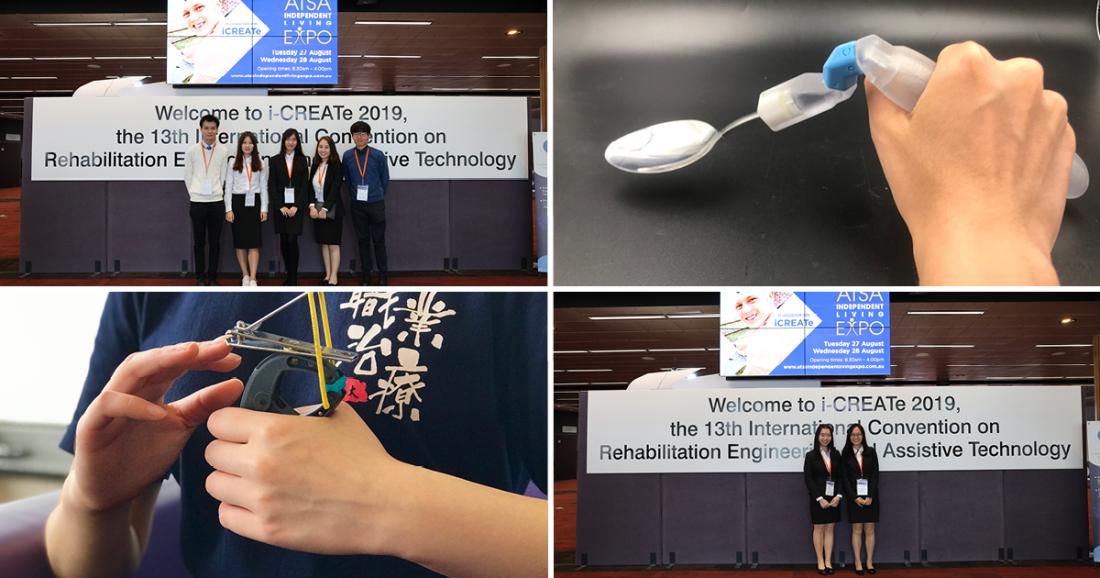PolyU students win Gold and Bronze Awards in Global Student Innovation Challenge at iCREATe 2019
The winning products, developed by Kristy Fung’s team and Elaine Mo’s team respectively, were “Snaker Spoon” (Gold Award), a spoon aimed at encouraging independent feeding, and “Nailed it!” (Bronze Award), a product which allows those with poor finger dexterity or arthritis to effortlessly clip their own nails.
In its 13th year, iCreate continues to provide an international platform for conferences, a Global Student Innovation Challenge, and exhibitions. These feature innovative technologies, new equipment, applications, techniques and materials, which can be applied to the field of Assistive and Rehabilitative Technology. iCreate is also an ideal global platform to share technical ideas and best practices.
In the Design Category of the Challenge, students were expected to apply a User-Centered Design process to produce a solution that “makes life easier” for its users, enhances the user experience (UX) or improves the quality of the professional rehabilitation practice. The solution may or may not be technology based.
Four teams of Occupational Therapy students from PolyU’s Department of Rehabilitation Sciences successfully reached the final round. The students were amongst 25 teams from all around the region, including Japan, Taiwan, Thailand, India, Malaysia, Singapore and Australia.
After the teams gave presentations on their entries, the judges viewed the award submissions firsthand. The prize-winning teams gathered at the Gala dinner held in Australia's Parliament House. The founder of iCreate and special guest of honour, Her Royal Highness Princess Maha Chakri Sirindhorn of Thailand, personally presented the awards to the winning teams.
Professor Hector Tsang, Cally Kwong Mei Wan Professor in Psychosocial Health, Chair Professor of Rehabilitation Sciences and Headof Department of Rehabilitation Sciences, said, “Our Occupational Therapy curriculum is not only aimed at nurturing students to enhance practical skills but to encourage students to find creative solutions to support the recovery and rehabilitation of people with disabilities. The Department is at the forefront of developing new knowledge in rehabilitation sciences, especially in the area of neuroscience, neurological and musculoskeletal disorders and geriatric rehabilitation, and taking an innovative approach to rehabilitation. We are particularly focused on promoting research that brings discoveries in sciences to clinical practice.”
The two prize-winning entries from PolyU are “Snaker Spoon” (Gold Award) and “Nailed it!” (Bronze Award):
Snaker Spoon – Gold Award
Team members: CHAN Wai Dik Ivan, YAN Oi Wai Iris, LO Ho Yan Lulu, FUNG Tsz Ching Kristy & TO Hiu Fung Hugo - BSc in Occupational Therapy Programme
The product is aimed at both children and adults with special needs, in particular those with upper limb disabilities. The product’s name comes from the spoon’s ability to twist like a snake. As compared with commercial angled utensils, the angle of the “Snaker Spoon” can be adjusted to meet the user’s needs and allow for independent feeding. The design can be applied to other utensils such as forks or knives.
Nailed it! – Bronze Award
Team member: MO Hoi Yi Elaine, WONG Hiu Yan Annie, CHAN Mung Ni Monica, LAU Wai Man & CHUI Tsz Kwan - BSc in Occupational Therapy Programme
Nail clipping is a necessary grooming task and using commercially available nail clippers require a strong lateral pinch and finger dexterity. The “Nailed it” clipper is designed to help people with weak pinch strength and poor finger dexterity as well as those with arthritis. “Nailed it!” allows people to clip nails using a palmar grasp in neutral wrist position effortlessly and successfully, without imposing stress on distal finger joints and thus reducing joint pain.



